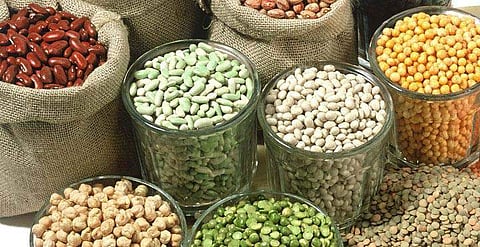

NEW DELHI: A looming crisis of pulses in the election year has prompted the government to extend the exemption in import duty on tur and black gram pulses till March 2025. A week ago, the government also exempted import duty on lentils. This will dent the image of India’s ambition to become self-reliant in pulse production.
The estimated lesser production of kharif pulses and shrinking of current rabi pulses sowing acreage has led the government to control domestic prices. Major pulses producing states are Karnataka, Gujarat, Maharashtra and Rajasthan. They have registered lesser pulses sowing areas in the current rabi sowing season.
Besides, the sowing of pulses crops in the current 2023-24 kharif season was reduced by 5.41 lakh hectares (LHa) compared to the 2022-23. A below average rainfall due to El Nino restricted the kharif acreage to 123 lakh hectares. The normal kharif pulses sowing area in the country is around 139.70 lakh hectares.
The production of kharif pulses has been stressed in the past two years. In 2022-23, the kharif pulses sowing area was reduced by around 4 per cent due to erratic rainfall in major pulses-growing areas. The tur pulses production was reduced by 15 per cent.
In the current 2023-24 kharif season, the total production of pulses is estimated at 7.1 million metric tonnes (mmt), which is lower by around 0.5 mmt than the last year and the lowest since 2016-17. The lower production of Tur led to a price increase of around 50 per cent in different mandis.
The inflation rate of pulses reached 20.23 per cent in November, which was 18.79 per cent in October 2023. Meanwhile, lesser production of pulses in the kharif season last year pushed prices to an all-time high since January 2023.
Recently, Arjun Munda, Union Minister of Agriculture and Farmer Welfare, told Parliament that India imports around 2.5 million tonnes of pulses almost every year to meet its domestic need. However, in the last six months, India has imported around 2 mmt of pulses. The government has already taken measures to reduce the retail price of pulses like imposing stock limits and removing import duty on pulses.